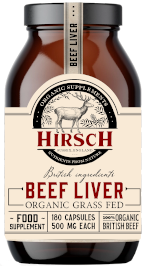Beef liver is a true superfood. It’s been used for aeons to promote fertility, speed recovery from illness…
…and promote athleticism.
What makes beef liver so good for athletes?
As it turns out, several things. Keep reading to learn why liver might just be the ultimate workout supplement.
- Beef liver: a sacred food?
- What makes beef liver so special?
- Beef liver for bodybuilding
- Beef liver for powerlifting
- Beef liver for other athletes
- How to use liver for energy
Beef liver: a sacred food?
Organ meats like beef liver have been considered sacred food since ancient times — and this sacredness seemed to carry over to the wonder we call athletic movement.
In Ancient Greece, athletes who ate beef liver and other animal products quickly stood out from the rest. A distance runner named Dromeus was the first Grecian athlete to prioritise meat consumption (prior to him, most athletes ate cheese instead). Dromeus went on to win two victories at the Olympics and two more at the Pythian games.
A renowned trainer named Pythagoras also recommended a meat-based diet to the athletes he trained. [1] For these athletes, organs like liver were of utmost importance.
Early anatomists agreed. “The liver is the source of the veins and the principal instrument of sanguification,” an anatomist named Galen wrote in his discourse on the human body. Other physicians agreed that liver health was central to overall health and performance. [2]
What makes beef liver so special?
Thousands of years later, modern science has finally made it clear why ancient athletes treated beef liver the way they did. Liver is rich in:
- Heme iron | While everyone knows that iron is critical for building healthy blood, not many know that the iron in food comes in two distinctive forms. Beef liver contains highly bioavailable heme iron. Research shows your body can absorb up to 35% of the heme iron you ingest. [3]
- Nucleic acids | Under normal conditions, your body can make nucleic acids via de novo nucleotide synthesis pathways. Under stressful conditions, however, the demand for nucleic acids can exceed production capacity, and nucleic acids become essential nutrients. [4]
- Lipotropics | Lipotropics are important amino acids or B vitamins that help maintain liver health. These nutrients help clear fats out of your liver, allowing normal liver function to continue and preventing cirrhosis. [5]
- Cytochrome P450 | Cytochrome P450 is an important family of enzymes involved in natural steroid production, liver detoxification, and more. [6]
- Potassium | This electrolyte helps your nerves maintain the right level of conductivity. It’s critical for muscle contraction, hydration status, and more. [7][8]
- Phosphorous | This essential mineral is used to maintain healthy bones and repair sensitive tissues. [9][10]
- Folate | Folate is an important B vitamin that assists with DNA production, cellular division, and nerve protection. Folate is especially important for pregnant mothers. [11]
- Carotenoids | Beef liver is rich in both beta carotene and preformed vitamin A. These vitamins are important for healthy vision, clear skin, and normal cellular differentiation. Liver is so high in carotenoids, in fact, that it shouldn’t be consumed every day. [12][13]
Beef liver for bodybuilding
Many diet and lifestyle trends begin within the eccentric world of bodybuilding, and beef liver’s resurgence was no exception.
It all began in the 1930s, when an Italian-American bodybuilder named Tony Sansone began touting the benefits of beef liver, other beef organs, and a variety of other whole foods. [14]
Sansone was ahead of his time — it wouldn’t be until the 1940s and 50s that other bodybuilders really began turning to beef liver for muscle gains. Armand Tanny, the 1950 Mr. America, famously promoted beef liver as part of an entirely raw animal-based diet. [15]
As the Weston A Price Foundation explains, liver’s growing popularity was also bolstered by scientific findings:
“Many bodybuilders used desiccated liver after the early 1950s experiments of Dr. Benjamin Ershoff. It was Ershoff who conducted the famous liver study wherein rats fed 10 percent desiccated liver swam far longer compared to controls.” [16]
Steve Reeves, one of America’s first movie stars, also viewed beef liver as one of the most important workout supplements. Reeves’s appearance was so impressive that he gathered crowds of shocked onlookers wherever he went. Here’s an account from Milton Moore:
“[Photographer] Tony Lanza and Steve were walking along, searching for a suitable location to begin shooting, when suddenly they heard a crash behind them. A man had driven his automobile into another car. He climbed out of the wreck, raced up to Steve, and shook his hand, saying, ‘I just had an accident over there, and I had to come over and congratulate you because you’re the cause of it. I couldn’t believe my eyes!’” [17]
As physically imposing as Tanny and Reeves were, neither of them possessed the most impressive physique of the 50s. That distinction belonged to Reg Park, a young British bodybuilder whose massive 105-kilo frame carried him to three Mr. Universe wins.
Reg’s dietary advice was as follows:
“[…] Step up your protein intake. Soft boiled eggs, cheese . . . LEAN BEEF, veal, liver, and all kinds of shellfish are good. Don’t use any white sugar but confine your ‘candy’ consumption to a few spoonfuls of honey each day.” [18]
Amazingly enough, Park got started in bodybuilding before synthetic steroids were readily available. To this day his physique represents the highest benchmark for just how muscular a drug-free — but liver supplementing! — human being can hope to get.
Can beef liver increase muscle growth? If Tanny, Reeves, and Park can be used as an example, we’d sure say so.
Beef liver for powerlifting
Having been popularised by bodybuilders, it wasn’t long until beef liver and desiccated liver supplements reached the powerlifting world.
In some cases, in fact, the very same bodybuilders mentioned above also used liver en route to setting powerlifting records.
Reg Park was the second man in history to bench press 227 kilos (500 pounds), having missed being first by just a few days. [19] Meanwhile Steve Reeves could do a 225 barbell curl from the ground while kneeling — surely a world record at the time. [20]
Finally, there’s the case of Arthur Saxon, a powerlifter who preceded both of these two. Saxon used a beef extract called Bovril en route to setting a still-standing world record in the “two hands anyhow” lift: 448 pounds! [21][22]
Beef liver and beef extracts remained a favourite tool of strength athletes for decades until they were finally overshadowed by synthetic steroids. Flash forward to the 21st century, and beef liver is still a popular workout supplement among natural powerlifters today. Desiccated liver capsules can be used both pre-workout and post-workout to increase strength and muscular endurance.
Beef liver for other athletes
Beef liver isn’t just good for building muscle. The very same factors that make it good for strength athletes also make it good for endurance athletes — runners, cyclists, etc.
What makes liver capable of helping so many different types of athletes?
We’ll give you a hint: virtually every type of exercise is stressful.
And that means that virtually any athlete can benefit from liver’s iron, enzymes, B vitamins, and other ‘anti-fatigue factors.’ [23] Interestingly enough, Dr. Ershoff’s early experiments with beef liver showed that it far outperformed isolate B vitamins, implying that liver’s unidentified anti-fatigue factors shouldn’t be discounted.
In addition to causing general overtraining syndrome, intensive exercise can also lead to chronically high liver enzymes. Athletes who want to push themselves to the max while staying healthy would do well to include some enzyme-rich beef liver in their diet. These enzymes, once ingested, may help compensate for the ones your body produces naturally. [24]
All in all, the unique combination of nutrients found in beef liver can combat stress and help your body adapt faster to whatever type of exercise comes its way. Beef liver supplementation is likely to shorten your recovery time from exercises of all sorts.
How to use beef liver for energy
At this point, you might be wondering how to experience beef liver’s strength-boosting, recovery-speeding benefits for yourself.
It’s actually pretty simple — the most obvious way to experience the power of beef liver is simply to eat it.
But this is easier in theory than in practice. Even those who don’t mind the metallic taste or smell of liver may not have access to fresh liver from cattle who were actually healthy.
And then there’s the potential for contamination. Considering that conventionally produced beef liver is susceptible to the buildup of certain heavy metals, one would be wise to select an organic option. [25]
If you don’t have access to fresh, organic beef liver — or if you’d just prefer something more convenient — then we may have an even better solution:
Hirsch’s Organic Beef Liver Capsules.
If you’re ready to supercharge your training the natural way, consider giving our Beef Liver Capsules a try. They place the power of beef liver conveniently in the palm of your hand. Six capsules contain enough nutrients to support your workout routine:
- 17.2% NRV of vitamin A
- 120% NRV of vitamin B7 (Biotin)
- 301% NRV of vitamin B12
- 139% NRV of copper
Buy Hirsch Organic Beef Liver Supplement
Hirsch offer an organic beef liver supplement that is sourced from independent organic UK farms and the liver is delicately processed to preserve the integrity of the organ meat. No synthetic nutrients or other ingredients are ever added.










